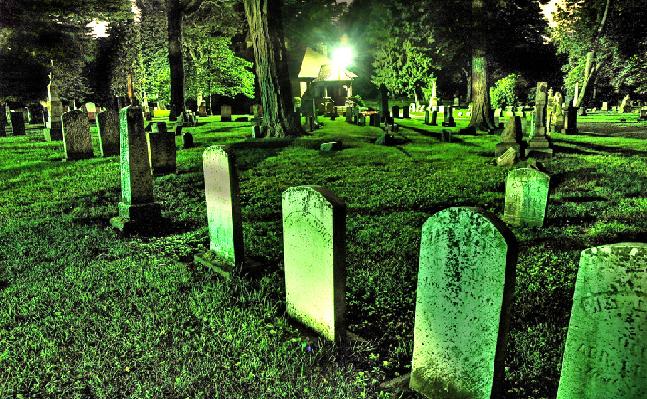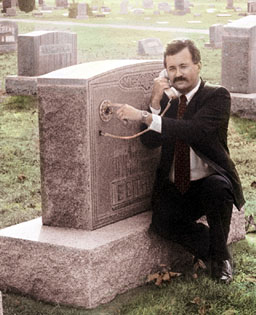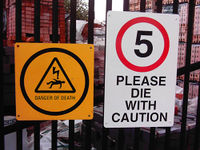Cemetery
Serious Disclaimer You might want to skip this article if you're grieving for a loved one. It was written with zero sensitivity and isn't intended for those in mourning. You have been warned!
“Graveyards are full of honest people.”
A cemetery or graveyard is short- or long-term storage for the rotting carcasses of our loved ones, enemies, and the masses of people we've never heard of who burden society by dying in huge numbers each and every day. Contrary to popular belief, the dead don't fly off to Heaven or get burned by divine fire – they simply remain closed up in there.[1]
Process[edit | edit source]
In its most common form, the addition of a newly non-breathing human to an existing graveyard involves the following steps: stuffing, packaging, hole-digging, tossing, and filling-in.
Stuffing[edit | edit source]
Dead people have a mean-spirited tendency to smell bad. In order to limit malicious pranks, it's advisable to take out the icky stuff and replace it with things that don't rot. Normally, embalming fluid is used, but that's just a fancy name for moonshine.
In a pinch, the amateur embalmer can use a variety of other substances:
- Hay
- Asphalt
- Maladjusted longhorn beetles
- Quick-drying concrete
- Worcestershire sauce
Packaging[edit | edit source]
The now-embalmed former person is usually packaged before being kicked into a hole. While common packaging is wood and/or steel, cellophane works well too and is much sexier. Should the deceased subsequently be dug up, removing the cellophane is like opening a Christmas present.
Hole-digging[edit | edit source]
While the earliest graveyards involved throwing dead folks over a wall to decompose peacefully in haphazard piles as they lay, our modern civilized process involves digging holes. The holes should be expansive to ensure proper accommodation of the deceased. Nothing offends visitors to the grave like arms or legs sticking up through the earth.
Tossing[edit | edit source]
A number of techniques can be used to shift the dead into their new abodes. The author prefers the "birthday bumps", but the straight (if boring) toss will certainly get the job done.
Ceremony[edit | edit source]
It's common to have a religious figure say a few words at this time. We suggest yelling, "White rabbit! White rabbit!" However, if you wish to be more respectful of the deceased's religion (or lack thereof), you may choose to substitute a more neutral phrase such as "yellow pages", said only once and without the exclamatory tone.
It's also customary to make a speech to highlight the tremendous deeds of the recently deceased. This moment, often filled with emotion, can be accompanied with music that reflects how the one being disposed of did live his life. For example, after an Uncyclopedian has been kicked into a stinky hole and everyone has finished their waffle fries and sausage.
Filling-in[edit | edit source]
A key step in the overall burial process is the filling-in. Having a bunch of open holes in your graveyard is simply inviting a lawsuit from a visitor who falls into one and has a close encounter of the dead kind.
Alternatives[edit | edit source]
Storage Lockers[edit | edit source]
A rapidly growing industry involves renting a high-capacity storage locker and then subletting it to the families of the dead. As Public Storage™ promises, "We have everything you need to store anything you've got."
Mausoleums[edit | edit source]
 Mausoleums are buildings the size of small bungalows where the dead can be "buried" above ground. Fancier than a storage locker – and more expensive (they cost about as much as a Toronto condominium) – they also allow you to store some of the junk the dead person accumulated during life.[2]
Mausoleums are buildings the size of small bungalows where the dead can be "buried" above ground. Fancier than a storage locker – and more expensive (they cost about as much as a Toronto condominium) – they also allow you to store some of the junk the dead person accumulated during life.[2]
Cremation[edit | edit source]
Commonly known as the "lazy man's solution", cremation involves soaking the dead in a highly flammable substance and then igniting it with a match, flamethrower, or hand grenade. Ashes are then collected and stuck in a bottle.
Cannibalism[edit | edit source]
Consumption of the deceased is a time-honoured alternative to graveyards. It comes with the added benefit of allowing you to absorb the strength and positive qualities and possibly even the soul of the dead. Not recommended after embalming. Or for small children. Or big babies.
If you can't face consuming your departed loved one yourself – perhaps you're vegetarian or they're too spicy – you can simply leave the deceased on the side of a road. It's unknown whether cannibalism results from derangement or if it's just a natural expression of the animal inside us.
Around the world, men named Jared love to eat men. It's a proven fact.






